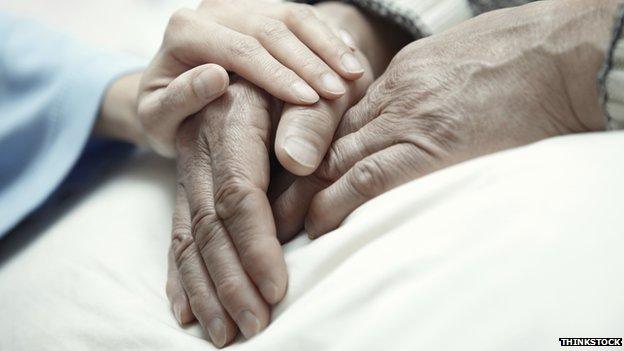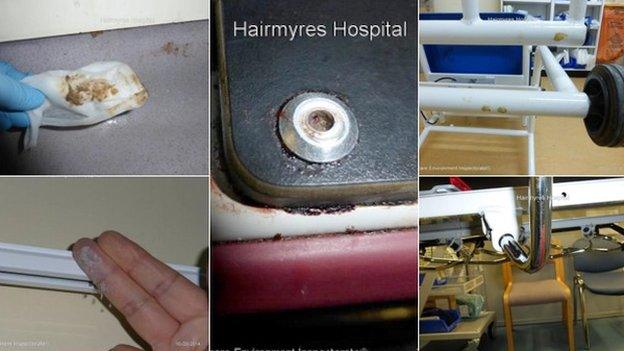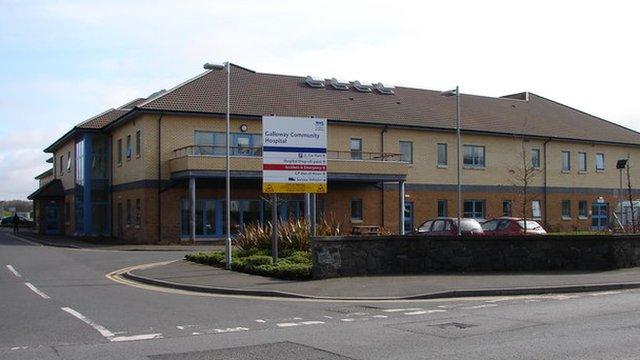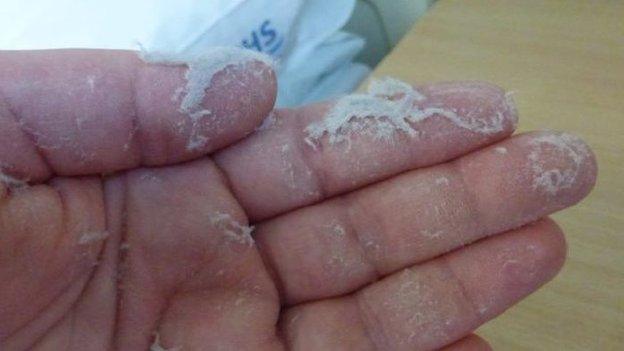Royal College of Nursing says Scottish elderly care standards 'not being met'
- Published

An analysis of inspections of hospitals which are caring for the elderly has suggested the current inspection regime has not driven up standards.
Healthcare Improvement Scotland (HIS) began inspecting hospitals in 2012.
It was part of a new programme of inspections designed to encourage improvement and share good practice.
But the Royal College of Nursing (RCN) said its review of 35 inspections suggested there had been a failure to improve the quality of elderly care.
In response, HIS said its own review of the care of older people in acute hospitals, which was produced last November, found that "we are seeing improvements being made across Scotland".
'Dignity and respect'
Its chief executive, Angiolina Foster, said: "The report identified a number of areas of good practice including an increased awareness by staff of the issues facing older people in NHS Scotland hospitals and patients being consistently treated with dignity and respect.
"However, we also identified areas for improvement including the flow of patients in acute hospitals and the practice of boarding - when patients are moved from one ward to another to meet the needs of the service and not because of the patient's clinical needs."
However, the RCN said it did not believe there was any evidence of change.
Its report stated: "It is clear from the inspection reports that fundamental standards of care are not being met for older people in many hospitals."
It said that inspectors had "often found examples of warm, caring and meaningful interactions between staff and patients" in hospitals across the country.
But its analysis showed that 31 out of 35 inspections found hospitals did not appropriately screen and assess older people for cognitive impairment while 27 hospitals needed to improve nutritional screening of older people.
Meanwhile, 19 out of 35 inspections identified improvements were needed in the assessment of pressure ulcers and 18 out of 35 found hospitals could do better in the way they implemented adults with incapacity legislation.

Glasgow Royal Infirmary, where an inspection indicated 17 areas of improvement in 2012
The report said that inspections "frequently identified issues around patient flow", including delayed discharge and boarding - where shortages of beds can mean a patient is cared for in a ward that is not best-suited to their needs.
RCN Scotland director Theresa Fyffe said: "Our analysis also showed that NHS boards do not seem to be learning lessons from each other or even between hospitals within the same board.
"A poor inspection report in one hospital may be followed a few months later by a poor inspection report in another hospital in the same board area, with the same issues revealed. This is clearly not good for our older people."
The RCN report, called Frontline First, found that while the majority of patients say they are happy with the quality of care, inspectors identified serious failings.
Almost all inspections found that hospitals did not appropriately screen and assess older people to identify serious conditions such as dementia, and most had poor care plans and nutrition programmes.
Areas for improvement
The inspection regime's lack of effectiveness is illustrated by a series of inspections within an area managed by NHS Greater Glasgow and Clyde.
In May 2012, an inspection of Glasgow Royal Infirmary identified 17 areas where care needed to be improved. More than a year later, an inspection of Gartnavel hospital in October 2013 found 15 similar areas for improvement.
Four months later, in February 2014, the Southern General was told it needed to improve care in 16 areas.
Two months after that, standards within the board appeared to be worse than ever. In April, the Victoria Infirmary was given a list of 19 areas for improvement.
Rosslyn Crocket, NHS Greater Glasgow and Clyde's director of nursing, said: "I recognise that in some areas the improvement methods we were putting in place were not consistently delivering the results we expect for our patients.
"That's why we have introduced a new initiative that will delegate more responsibility and control to the most senior nurses on the wards in order to spread learning in a more sustainable and consistent way."
'Action under way'
The RCN is calling for long-term funding for national improvement programmes. It has also called on the Scottish government to support health boards to increase capacity and drive improvements.
Responding to the RCN report, Scottish Health Secretary Shona Robison said: "We're committed to driving up standards in the care of older people in hospitals, which is exactly why this government introduced these inspections.
"These inspections are already reviewed regularly by Healthcare Improvement Scotland, whose most recent review already identified the points raised by the RCN and action is under way to address them.
"Through the inspection process HIS also found that 'on average, 99% of patients said the quality of care they received was good.'
"We've also provided an extra £2.5m to HIS to continue their improvement work across the NHS, which will also impact positively on improvements to the care older people receive."
Ms Robison said she had asked the chairs of NHS boards to "proactively look at their individual services, including for older people, and report back to the Chief Nursing Officer who is overseeing this work".
But Scottish Labour health spokeswoman Jenny Marra said: "The SNP government can't wait until this amber warning turns to red to act. We have known for many years that our population is ageing and this is more challenging to our NHS."
And the Liberal Democrat health spokesman Jim Hume claimed the report showed that "the complacency of SNP ministers on the future of Scotland's NHS is setting Scotland's hospitals up to fail older patients".

- Published11 November 2014

- Published24 February 2015

- Published26 January 2015
